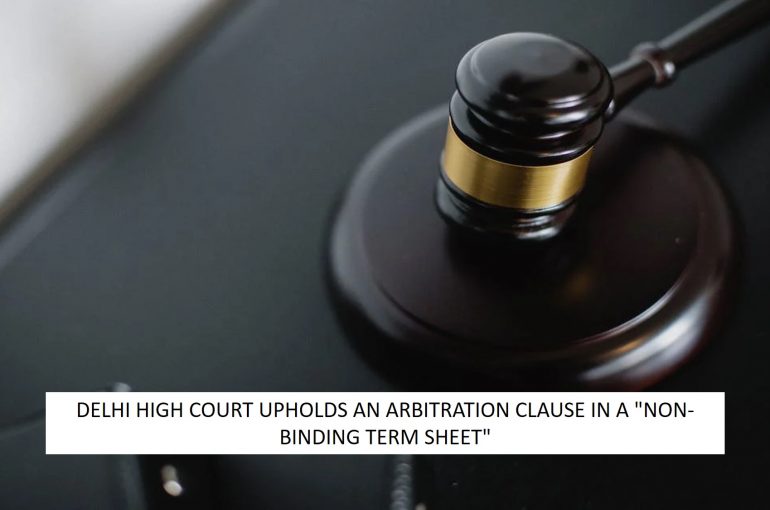DELHI HIGH COURT UPHOLDS AN ARBITRATION CLAUSE IN A “NON-BINDING TERM SHEET”
Recently, a Single Judge Bench of the Hon’ble Delhi High Court comprising of Justice Navin Chawla passed a Judgment dated 19.12.2022 in Welspun One Logistics Parks Fund Vs. Mr. Mohit Verma & Ors., Arbitration Petition. No. 792/2022, and observed that the dispute between the Parties under Agreement titled as “Non-Binding Term Sheet”, can be referred to arbitration, as the Arbitration Clause contained in the said “Non-Binding Term Sheet” was binding between the Parties.
FACTS
The Parties have entered into the “Non-Binding Term Sheet” Agreement dated 26.11.2021 for transfer of land in favour of the Petitioner- Welspun One Logistics Parks Fund. But owing to disputes that arose between the Parties, the Petitioner invoked the Arbitration Clause in the “Non-Binding Term Sheet” Agreement, vide Notice dated 06.06.2022. The Respondents sent a Reply Notice dated 05.07.2022 through their Counsels, thereby refusing the appointment of arbitrator.
It is pertinent to mention here that the provision for arbitration between the Parties was contained in Clause 12 of the “Non-Binding Term Sheet” which provided that “All disputes arising out of and/ or due to this Term Sheet shall be resolved by arbitration in accordance with the Arbitration and Conciliation Act, 1996 through a sole arbitrator to be mutually appointed by the Parties with seat and venue in Delhi”.
Though the Agreement was titled as “Non-Binding Term Sheet”, one of the other Clauses therein provided that “Notwithstanding the usage of “Non – Binding” as a suffix to the Term Sheet at certain places above, it is agreed that the Term Sheet shall be binding upon the Parties to the following extent and clause only during the Term” and “The Clauses pertaining to Confidentiality, Expenses and Dispute Resolution, shall be binding upon the Parties.”
REASONING AND ANALYSIS OF THE HIGH COURT
As the Respondent refused the appointment of arbitrator, the Petitioner filed a Petition under Section 11(6) of the Arbitration and Conciliation Act, 1996 (Act) (Appointment of an arbitrator) seeking appointment of an arbitrator for adjudicating the disputes that have arisen between the Parties in relation to the “Non-Binding Term Sheet‟ dated 26.11.2021.
The High Court vide Judgement dated 19.12.2022 made the following observations:
- That an arbitration agreement is a separate agreement distinct from the main contract, even though it may appear as one of the clauses of the main agreement.
- In deciding whether the parties can be referred to arbitration or not, the Court would have to carry out only a prima facie and preliminary study of facts to determine if the arbitration agreement itself, has been shown to be void or voidable. It is only when the above is shown, that the Court can refuse to refer the parties to arbitration.
- Further, while conducting the aforesaid prima facie and preliminary study of facts, the Court has to ensure not to carry out extensive study of facts, as the scope of judicial review and exercise of jurisdiction under Section 11 of the Act is extremely restricted and limited. In fact, the Arbitral Tribunal is the preferred first authority to determine and decide all questions of non-arbitrability of disputes.
- That the Court, while exercising powers under Section 11 of the Act, can refuse to refer the parties to arbitration only where “it is manifestly and ex facie certain that the arbitration agreement is nonexistent, invalid or the disputes are non-arbitrable, though the nature and facet of non-arbitrability would, to some extent, determine the level and nature of judicial scrutiny.” The Court, by default, would refer the matter to arbitration when contentions relating to non-arbitrability are plainly arguable. The Court must act on the principle “when in doubt, do refer.”
- Further, the High Court held that whether the other covenants of the “Non-Binding Term Sheet” were enforceable or not, may not to be considered by the Court at the stage of considering an application under Section 11 of the Act.
CONCLUSION
Based on the aforesaid observations, the Delhi High Court observed that though the title of the Term Sheet is “Non-Binding Term Sheet”, the Arbitration Clause therein has been specifically made binding on the Parties. Thus, the High Court allowed the Section 11 Petition and appointed a Sole Arbitrator in this case to adjudicate the disputes between the Parties in accordance with the provisions of the Act. The High Court further held that all the objections of the Respondents would have to be considered on merit by the learned Sole Arbitrator, without being influenced by any observations made by the High Court in the aforesaid Order.
Devashish Kakkar
Legal Associate
The Indian Lawyer





































Leave a Reply